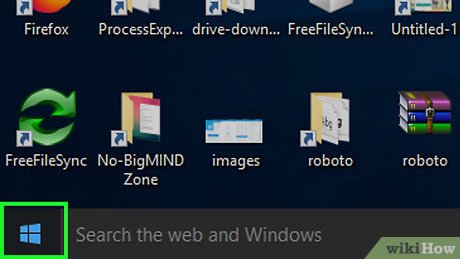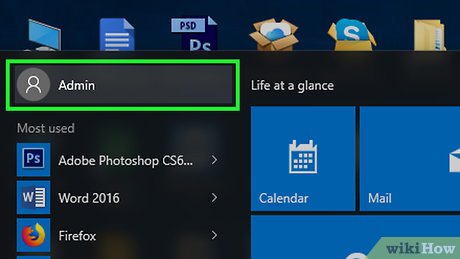How to Change Your Password on Windows
Method 1 of 3:
Changing your Current Password
-
 Click themenu. It's usually at the bottom-left corner of the screen.
Click themenu. It's usually at the bottom-left corner of the screen.
-
 Click your username or photo. It's in the far left column of the Windows menu.
Click your username or photo. It's in the far left column of the Windows menu.- If you don't see this, click , and then click Accounts.

- If you don't see this, click
-
 Click Change account settings. The Settings window will appear.
Click Change account settings. The Settings window will appear.- If you clicked in the last step, just skip to the next step.

- If you clicked
-
 Click Sign-in options. It's in the left column.
Click Sign-in options. It's in the left column. -
 Click Change under the 'Password' section. This opens a new window that asks you to sign in to your Microsoft account.
Click Change under the 'Password' section. This opens a new window that asks you to sign in to your Microsoft account.- If you're not signed in with a Microsoft account (rare), you'll see a screen that asks you to enter your current password. Enter it, click Next, then follow the on-screen instructions to create a new password.
-
 Enter your password and click Sign in. You should now see the Change Password screen.
Enter your password and click Sign in. You should now see the Change Password screen.- If you don't know your password, see this method.
- You may be prompted to select an email address or phone number to receive an access code. If this happens, follow the on-screen instructions to complete the verification.[1]
-
 Type your old password into the first blank. This is just to confirm your identity.
Type your old password into the first blank. This is just to confirm your identity. -
 Type your new password into the next two blanks. Make sure you type the password the same both times.
Type your new password into the next two blanks. Make sure you type the password the same both times. -
 Click Next. Your password is now reset.
Click Next. Your password is now reset.
Method 2 of 3:
Resetting your Microsoft Password
-
 Go to https://account.live.com/password/reset in a web browser. If you're locked out of your computer, you can complete this method on another computer.[2]
Go to https://account.live.com/password/reset in a web browser. If you're locked out of your computer, you can complete this method on another computer.[2] -
 Select 'I forgot my password' and click Next.
Select 'I forgot my password' and click Next. -
 Enter the email address or phone number associated with your Microsoft account.
Enter the email address or phone number associated with your Microsoft account. -
 Enter the characters you see on the screen. If you're unable to see them, click New for different characters, or Audio to hear them aloud.
Enter the characters you see on the screen. If you're unable to see them, click New for different characters, or Audio to hear them aloud. -
 Click Next.
Click Next. -
 Select a verification method. Microsoft will send a security code to the email or phone number you select from this list. The letters are partially hidden, so you'll need to fill in the blanks when prompted to prove your identity.
Select a verification method. Microsoft will send a security code to the email or phone number you select from this list. The letters are partially hidden, so you'll need to fill in the blanks when prompted to prove your identity. -
 Click Send Code. Microsoft will now email or text you a code you'll need to enter on the next screen.
Click Send Code. Microsoft will now email or text you a code you'll need to enter on the next screen. -
 Enter the code and click Next. Once the code is accepted, you'll see the Reset Password screen.
Enter the code and click Next. Once the code is accepted, you'll see the Reset Password screen. -
 Enter and reenter your new password. Be sure to type the new password exactly the same into both blanks.
Enter and reenter your new password. Be sure to type the new password exactly the same into both blanks. -
 Click Next. Your password is now reset. You can now log back into your computer using your Microsoft account name and password.
Click Next. Your password is now reset. You can now log back into your computer using your Microsoft account name and password.
Method 3 of 3:
Resetting a Local Account Password with a Reset Disk
-
 Attempt to sign in to Windows. If you type the password incorrectly, you'll see an error message.[3]
Attempt to sign in to Windows. If you type the password incorrectly, you'll see an error message.[3]- This method will only work if you are not using a Microsoft account to access your computer. You must also have a Password Reset disk or drive.
-
 Click Next.
Click Next. -
 Insert your password disk or drive.
Insert your password disk or drive. -
 Select the password disk or drive from the drop-down menu. For example, if you inserted a CD or DVD, select your CD or DVD drive.
Select the password disk or drive from the drop-down menu. For example, if you inserted a CD or DVD, select your CD or DVD drive. -
 Click Next. Windows will now read your password reset disk or drive.
Click Next. Windows will now read your password reset disk or drive. -
 Type and confirm a new password. The new password must be typed the same way into the top 2 blanks.
Type and confirm a new password. The new password must be typed the same way into the top 2 blanks. -
 Type a password hint. This goes into the box at the bottom of the window. Enter something that will jog your memory in case you forget the new password in the future.
Type a password hint. This goes into the box at the bottom of the window. Enter something that will jog your memory in case you forget the new password in the future. -
 Click Next.
Click Next. -
 Click Finish. Your password is now reset. You can use your new password to sign back into Windows.
Click Finish. Your password is now reset. You can use your new password to sign back into Windows.
Share by
Jessica Tanner
Update 04 March 2020






























